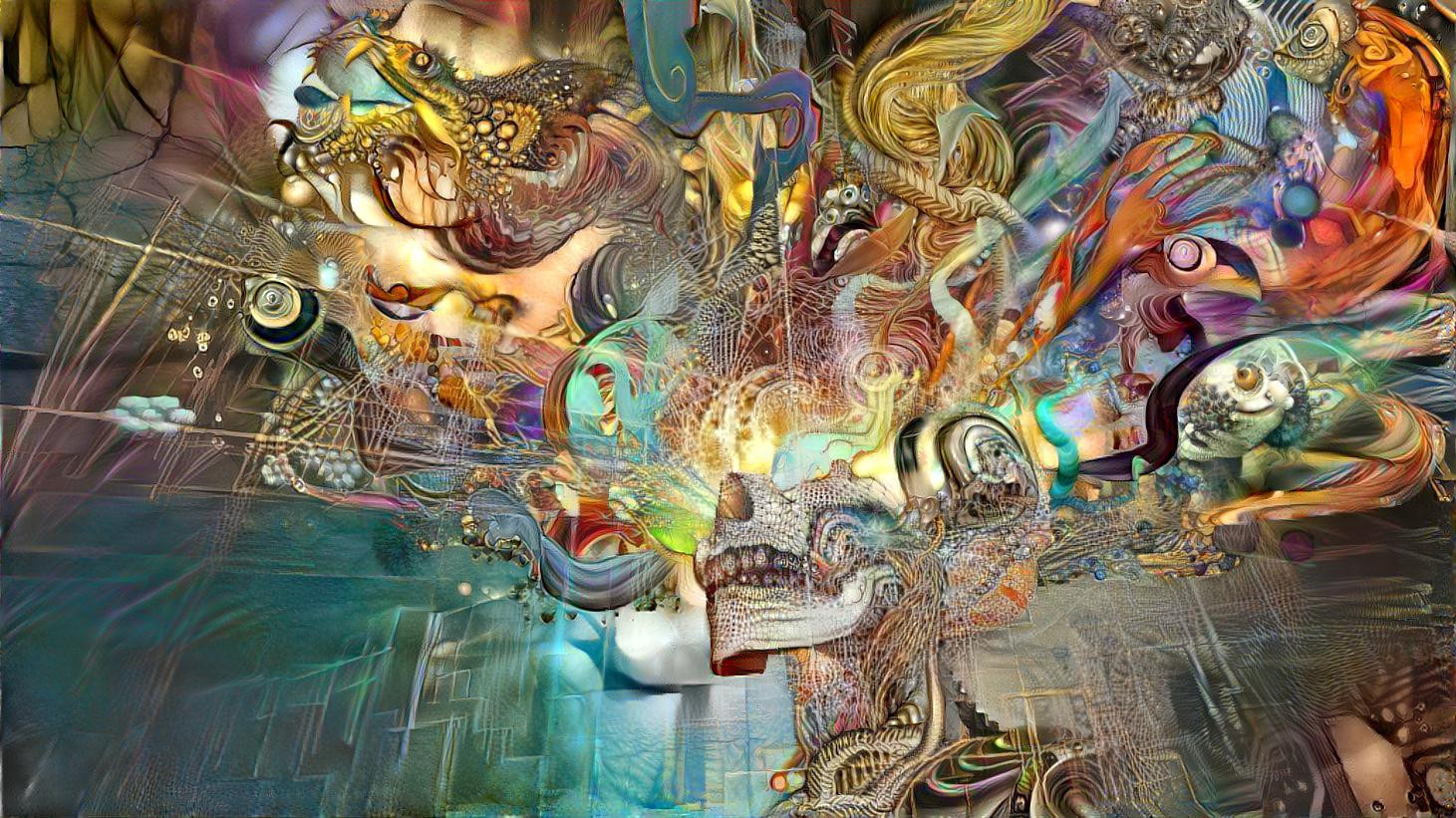Our goals, plans, purposes, theories and strategies are how we avoid the intrinsic uncertainty of life, which – as a general statement – is obvious enough! The whole point about goals, plans, strategies, etc are that they take us somewhere definite, somewhere preordained. Goals, plans and strategies are all for the sake of ‘avoiding surprises’! This, as we have said, is pretty obvious but what is not so obvious, perhaps, is that the inherent or intrinsic uncertainty of life actually is life. Life, when you take away the intrinsic uncertainty, isn’t life, in other words. So what we’re saying here, if we go back to our original statement, is that our goals, plans and strategies are our way of avoiding life.
No one’s going to have this though. We’re not going to admit that we’re in the business of avoiding life – not in a million years are we going to admit this! We couldn’t carry on with the all-important business of ‘avoiding life’ if we admitted that this was what we were doing – that would be the end of our ‘avoidance’ in one go. Our whole ethos, our whole ‘rationale for everything’, is that we are engaging with life in a positive and productive way – this is the basis upon which all our illusions rest! Imagine going through the motions of living our life (or what we take to be our life) and yet at the same time being aware that what we are actually doing is avoiding life, running away from life. That would make us feel pretty sheepish about ourselves, to say the least!
But we don’t – for the most part – go around feeling pretty sheepish about ourselves. That’s not how it is – the usual way for us to be, when our illusions are intact, is perfectly confident and self-assured, without having to actually have any real basis or substance to this confidence. We are perfectly confident that we are engaging fully with life, that we are facing it ‘full on’. This however is just not the case; it’s the complete reverse of the case. We’re not facing life ‘head on’, we’re facing in the opposite direction – we’re not just facing in the opposite direction we’re running in the opposite direction as fast as we possibly can whilst pretending that we’re not. We’re not engaging with life therefore but with our games, with our systematic distractions from it. We’re addicted to avoiding life, we’re addicted to certainty.
We’re not running towards life we’re running towards certainty and certainty is the antithesis of life. The reason we can say that certainty is the antithesis of life is because it replaces life, because it substitutes itself for life. We end up thinking that our ‘positive knowledge’ of the world is the world and so we don’t the world at all. We’re caught up doing ‘something else’ – something that isn’t actually life at all. We don’t have any time for life as it actually is in itself; we don’t have any interest in it. The rational mind – when it takes over – always does this to us – it presents the world to us in terms of definite categories. We then fixate for all we’re worth on these ‘definite categories’, thinking that life is there, thinking that all the answers are there, and so we miss the main event entirely! We were looking in the wrong direction so of course we missed it. We were looking in the wrong direction because life isn’t a definite category…
How could life be a definite category? How could it be a Yes or a No, a Win or a Lose? ‘Yes’ in relations to what exactly? ‘No’ in relation to what? Who’s winning or losing, hoping or fearing? There’s nothing to compare life with; there are no genuinely existent ‘goal posts’ – only the goal posts that we ourselves have put there, only the goal posts that exist in our head. Without goal posts there can be no hit or miss, right or wrong, yes or no. As Kurt Vonnegut has his character Kilgore Trout say in Breakfast Of Champions, ‘it’s all life, every bit of it…’ This is another way of saying that there are no categories for it, no parts of it that are relevant or irrelevant, more important or less important. The thinking mind is however always dividing everything up into relevant / irrelevant, more important / less important. This activity of sorting everything out into relevant versus irrelevant, important versus unimportant is the thinking mind in a nutshell, that’s what’s it’s all about. The question is again however, ‘relevant or irrelevant to what?’ ‘Important or unimportant to whom?’ Life isn’t relevant to anything; it isn’t a matter of ‘relevancy’. It isn’t – as we have said – a category of thought.
What we are actually doing here is of course ‘comparing everything to our made-up yard-stick of the thinking mind’ and then saying – on this basis – that stuff is ‘this’ or ‘that’. This is what we seem to love doing more than anything else in the world! We obsessively compare everything to the made-up parameters that we have projected onto the world; we do this and then – preposterously – imagine ourselves to have said something meaningful! We imagine ourselves to have said something real or significant about the world. Not only do we imagine ourselves to be saying something real and significant about the world, we create an entire self-consistent world of our own made up out of the positive knowledge / positive data that we have gathered and this positive world operates (or ‘gets to exist) via the trick of us ‘reversing’ (or ‘flipping-over’) our attention in the same way that we do when we look at one of those visual puzzles that contains two complementary figures, only one of which can be seen at any one time. To see one figure is not to see the other, in other words.
So just as seeing one figure in the visual puzzle relies on us not seeing the other, the apparent existence of the positive world (which for us is the only world) relies on us not seeing the inherent uncertainty of everything. This essentially means that we are putting all our attention on looking at what lies inside the box, and none at all at what might be outside the box. We don’t even acknowledge that there is an outside; we especially don’t acknowledge that there is an outside, and this means that we don’t acknowledge that there is a box. ‘Box? What box?’ we say, ‘There’s no box!’ When we do this (which equals ‘only registering stuff that makes sense within the context of the assumed framework’) then we create the positive world, which then becomes – to us – ‘as real as real can be’. We’re making the positive world seem real by ‘ignoring the negative world’; or – as we could also say – we’re making the ‘Little Picture’ seem real by ignoring the Big Picture’, which we totally do. It is because we’re so very keen (and that’s a tremendous understatement!) to make the Little Picture seem real we invest everything we’ve got in ignoring the Big Picture. Pretending that the Big Picture isn’t there (which equals ‘ignoring reality’) is what we all do all of the time!
It’s actually very easy to see how this business of ‘ignoring the Big Picture’ works. As we’ve just said, we do it all of the time and it’s not that hard for us to notice that we’re doing it, if we care to do so – all we have to do is to ‘pull back’ a bit! We’re ‘focussing on the practical details and ignoring all the big questions’ and this generally works very well for us. When we use the phrase ‘the big questions’ this isn’t to imply that there are any answers to them (that we can find if we look hard enough or ask the right people) – if there were answers then we’d be talking about the ‘realm of certainty’ and we’re not. Certainty isn’t interesting – it’s just something we are drawn to out of our need for security, however false or deception the sense of security we find might be. We’re not talking about ‘finding answers’, we’re talking about ‘the realm of inherent uncertainty’, which can be more intuitively expressed simply as ‘the space within which everything happens’.
We all know how this manoeuvre works – we focus on the nuts and bolts of the ‘how’ and turn a blind eye to the uncomfortable question of ‘why’? ‘Why?’ is uncomfortable because – ultimately – there is no ‘why’? There are no structures determining that things should happen this way rather than that way; there is only space, the space within which everything happens, and that space doesn’t determine or define anything. Space simply allows and it doesn’t care what it allows, and this type of freedom terrifies us. We’d much rather be in the narrow little realm where everything is determined and defined for us; the narrow little realm where things can happen because they’ve been told that they can happen, where things exist only because it’s been ordained by the appropriate authorities that they can exist. We want to be embedded in the determinate matrix of structure where we will never have to encounter ‘freedom’ or ‘intrinsic uncertainty’. We want to be fully-defined by a black-and-white ‘script’ that has no gaps in it…
It’s very clear indeed therefore that we are not in any way running towards life in the way that we would like to believe we are. We’re running towards the realization (or hoped-for realization) of our goals, towards the supposedly glorious fulfilment of our ‘concrete dreams’, but this has nothing whatsoever to do with life, despite all our claims. Life doesn’t come into it, just our shop-worn ideas and beliefs about it! Our goals and our structures are distractions from openness (or ‘radical uncertainty’) – what have goals and plans and strategies have to do with openness, after all? Goals and plans and strategies are how we end openness. Another way of getting at this is to say that our preoccupation is with technical or literal language rather than with poetry or metaphor. Poetry and metaphor carry no weight with us, and yet this is what connects us to reality itself, as opposed to our narrow, claustrophobic structures. It is through poetry and metaphor that our spirit flies, rather than being imprisoned in a test-tube or filing cabinet somewhere. And yet this emphasis on the technical and the literal is no accident – we seriously don’t want to fly! Flying is most definitely not our thing – we have a very big phobia about it….
Anything we look at long enough starts to manifest its inherent uncertainty. This is a matter of common experience, available to us all. If we look at anything long enough, in a quiet state of mind, and we will start to become uncertain of it! We’re only ‘certain’ about things, in other words, when we don’t do this, when we don’t observe the world (or anything in it) for any length of time whilst in a quiet or contemplative state of mind. In order to remain certain of what things are and where they belong in the great scheme of things we have to avoid getting up close and intimate with them – we have to keep them at arm’s length, we have to be forever imposing our own structures and classifications on them. It’s the game that we’re playing with things that keep them ‘certain’ (or keeps us certain about them, rather) and were we to let go of our obsessive games for a while we would soon see our precious certainty go flying out of the window…
Whenever we give things time to be what they actually are (as opposed to what we think they are) they turn out to be not what we took them to be at all. The free spirit of ‘intrinsic uncertainty’ then comes back into the world, so to speak. The apparently immutable ‘positive world’ starts to dissolve in the most intriguing fashion all around its edges. Poetry starts to return to the world as the deadly grip of literalism (the bureaucracy of the rational mind) is loosened. Spring returns to Narnia after the long, long winter and everywhere we look flowers are starting to bloom! The question here however is whether we are aligned to the Ice Queen or whether we are secretly (or not so secretly) delighted by the thaw. The question is, which camp do we fall in?
It doesn’t do to underestimate the power of the part of us that wants everything to be in the right box, in the right compartment. We are inclined to have to have romantic notions about ourselves, but when the chips are down we will find out very quickly if we’re in the pay of the Ice Queen or not. How strong within us is the spirit of inquisitiveness, that unruly tendency to be curious and question the rules? What are its chances when the gloves come off and we are faced with the brutal hold that unbridled rationality has on us? What are our chances to find freedom within this terrible ‘hostile environment’ that we have created for ourselves? This frightfully bleak and hostile environment in which consciousness itself is an unwanted intruder…






